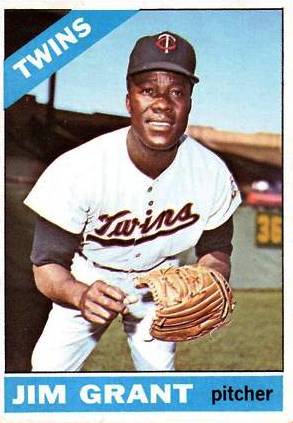The Year of the Mudcat
By Dr. Daniel Durbin | 7/22/13 |
Howie Reed knew exactly what he wanted to do. Jim “Mudcat” Grant was a pitcher. You never let a pitcher beat you on a fast ball. Reed stared down at Mudcat, rocked back, and broke loose with a beautiful arching breaking ball.
Unfortunately for Reed, Mudcat knew the pitcher’s rule as well. He was looking for a breaking ball. Mudcat crushed the ball. Ray Scott, who was calling the sixth inning of the sixth game of the 1965 World Series paused for a moment out of shock and then spat out the words that keep pitchers awake at night. There was “no doubt about that one.”
In many respects, that home run was the high water mark of Mudcat Grant’s career. Mudcat had been a star pitcher for the Cleveland Indians and Minnesota Twins throughout the early 1960’s. President Kennedy had been such a fan that he’d asked Mudcat to breakfast. But, 1965 was the pinnacle.
Mudcat was brilliant in 1965. He won 21 games, the first African-American pitcher to win 20 or more games in a season in the American League. He pitched the Minnesota Twins into the World Series and won the first game. When the Twins were down to their final game, needing a win in the sixth game to keep alive, Mudcat not only pitched brilliantly to a 5-1 victory, he helped his own cause with a three-run home run.
Trades, being drafted to an expansion team, and becoming a relief pitching specialist would keep Mudcat from repeating the tremendous starting success of 1965. Mudcat would leave baseball after the 1971 season to become the first African-American color commentator for an American League franchise (the Indians) and to continue his career as a blues singer (a career that would ultimately earn him far more money than playing in the Major Leagues had).

Mudcat turns 78 in about three weeks. He is slowed (though not much) by rheumatoid arthritis and diabetes. Between blues performances and charity events, Mudcat has spent this summer telling the story of his life for an oral histories project we’ve developed at the USC Annenberg Institute of Sports, Media and Society.
The AISMS is creating a comprehensive library of digital recordings of African-American Major League Baseball players who played in the 25 years after Jackie Robinson and Larry Doby broke baseball’s color line. You can find a description of the project on the following link. AISMS Baseball Research Program
Mudcat Grant was the first player to jump in and volunteer his services for this project.
It’s interesting. When Mudcat sits to talk about his life, the interviewer and the technician are the only people around. Soon, one person after another stops by to listen in as Mudcat talks about hiding from the Ku Klux Klan as a child, as he eloquently remembers his reaction to the death of President Kennedy, as he opens up about the use of the spitball in 1960s baseball. Before long, little work is being done as everyone in the vicinity is engaged in the memories of a 77 year old man. It would be criminal if the memories of Mudcat and the many other players of his era were lost to time.
October 13, 2015 will mark the fiftieth anniversary of Mudcat’s World Series saving home run. It will mark the fiftieth anniversary of the year of the Mudcat.
By that date, I hope to see another year of the Mudcat. I hope to see a year in which the USC Library of Oral Histories of the African-American Experience of Major League Baseball is fully functional and online. I hope to see a year in which the memories of all the African-American players who took sports’ largest stage during an era of unprecedented national turmoil are preserved for posterity.
On October 13, 2015, I hope to celebrate a new year of the Mudcat with the man whose talents shone so brightly on black and white television sets across the United States fifty years before.

COMMENTS